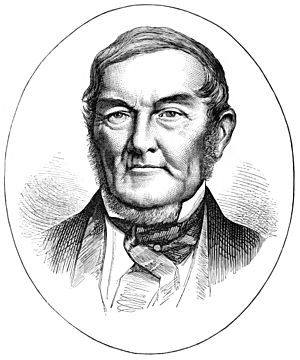Zephaniah Williams facts for kids
Quick facts for kids
Zephaniah Williams
|
|
|---|---|

1874 engraving
|
|
| Born | 1795 near Argoed, Sirhowy Valley, Monmouthshire, Wales
|
| Died | 8 May 1874 (aged 78–79) |
| Nationality | Welsh |
| Education | self-educated |
| Occupation | Mineral Agent |
| Years active | 1839 |
| Known for | Chartism |
| Criminal penalty | Transportation |
| Criminal status | Pardoned |
Zephaniah Williams (1795 – 8 May 1874) was an important Welsh leader. He was a coal miner and a key figure in the Chartist movement. This movement worked for more rights for ordinary people.
Williams was one of the leaders of the Newport Rising in 1839. This was a large protest for political change. He was found guilty of a serious crime against the government. His punishment was changed from death to being sent away for life. He was sent to Tasmania, an island near Australia. Later, he was set free. He became very successful by finding coal there.
Early Life and Learning
Zephaniah Williams was born in Wales, near a place called Argoed. He spent much of his childhood near Blackwood. He also lived in Caerphilly and Nantyglo for some time.
He was lucky to get a good amount of schooling. He learned to read and write in both English and Welsh. He also taught himself a lot, especially about geology, which is the study of rocks and the Earth.
When he was 25, he married Joan. They had a son named Llewellyn. Later, their daughters Jane and Rhoda were born.
Zephaniah had strong ideas about how society should work. He believed in thinking freely and questioning things. He became a coal miner, also called a collier. Later, he became a Master Collier in Blaina. He also ran an inn called the Royal Oak in Nantyglo. He would pay his miners at this inn.
A Chartist Leader
Zephaniah Williams was a very independent thinker. He often hosted meetings for working men at his home. He met John Frost, another important Chartist leader, in Blackwood. Frost was a local judge who supported the Chartist cause.
Because of his strong beliefs and leadership skills, Zephaniah became a natural leader. He helped guide the Chartist movement in south east Wales. The Chartists wanted to change the voting system in Britain. They believed all men should have the right to vote.
Williams was later charged for his part in the Chartist Newport Rising. This event happened in Newport, Wales, on 4 November 1839.
The Newport Rising
Zephaniah Williams, along with John Frost and William Jones, led a large group of men. They marched from the Nantyglo area towards Newport. They reached the edge of the town around 9 AM.
The men marched through the town, heading towards the Westgate Hotel. About thirty soldiers were waiting at the hotel. This event is sometimes seen as the biggest armed protest in Britain during the 1800s.
The men gathered at the Royal Oak inn before their march into Newport. Zephaniah was known for his strong political views. He was also known for solving problems in his own way.
Life in Australia
Because of his role in the Chartist Rising in Newport, Zephaniah Williams faced a trial. This trial was held in Monmouth on 16 January 1840. He was found guilty of a very serious crime against the government. The original punishment was death by hanging.
However, his sentence was changed. Instead of being executed, he was sent away for life. This was called "transportation." He was sent to Van Diemen's Land, which is now called Tasmania, Australia. He arrived there on the last day of June 1840.
In 1848, he wrote about the difficult conditions in the colony. He even thought about escaping, but he stayed.
In 1854, he received a special pardon. This allowed him to live anywhere except the United Kingdom. Two years later, in 1856, he received a full pardon. He decided to stay in Tasmania. His wife and family then joined him from Wales.
While in Tasmania, Zephaniah made an important discovery. He found coal on the island. He became very wealthy from this discovery. He helped start the coal mining industry in Tasmania.
Zephaniah Williams died a successful man in Launceston, Tasmania, on 8 May 1874.
See also
- List of convicts transported to Australia

